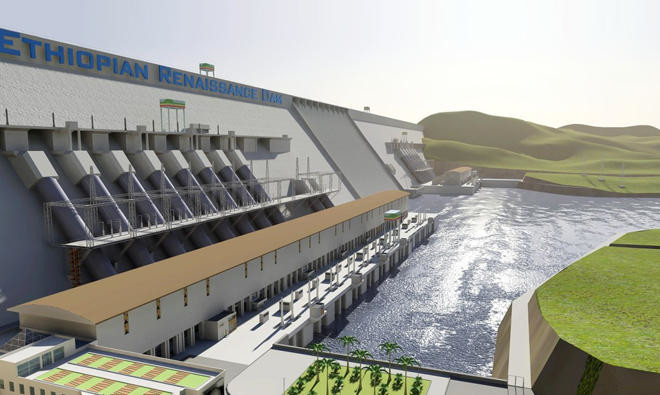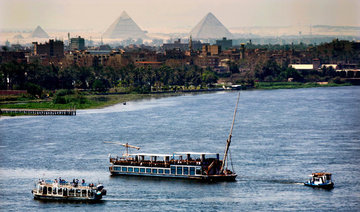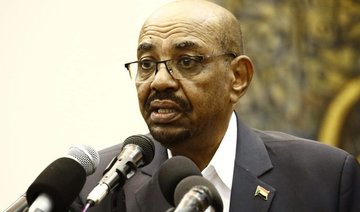CAIRO: Egypt has “many alternatives” to deal with the stalled technical negotiations on the Grand Ethiopian Renaissance Dam (GERD) with Ethiopia and Sudan, Egypt’s Minister of Water Resources and Irrigation Mohamed Abdel Ati has said.
“We have many alternatives in between the two impossible alternatives; to dispense with the Nile water and not to build the dams altogether," he said. There are other ways to negotiate, and Egypt has started many of these ways, but they cannot be declared,” the Egyptian minister said on Saturday during a visit to the northern governorate of Dakahlia.
The minister said that Egypt could not prevent the construction of the dam, but it also could not afford any substantial deficiency in its historical share of water.
“We have to admit that the dam is damaging to Egypt. We are currently working on making this damage, which will lower Egypt's share of water, not serious. We will not allow this to happen.”
Abdel Ati said that the Nile is not just a water resource, echoing Egyptian President Abdel Fattah El-Sisi's statements that the Nile for Egypt is a matter of life or death.
“We are a desert country and we rely on 97 percent of water from outside the border, both in terms of the share of the Nile and the groundwater shared by Egypt, Libya, Sudan and Chad,” he said.
“The rate of consumption of irrigation water in Egypt is 80 billion cubic meters, and only 60 billion is available,” Abdel Ati said. “We compensate for the difference with waste water treatment. Egypt’s share of water is stable while its population is growing at a high rate.”
He predicted that the population of Egypt will reach about 170 million in 2050, up from the current 100 million.
Abdel Ati said that desalination was not a substitute to compensate Egypt for any substantial shortage of its share of Nile water during the years of filling the dam. He stressed that Ethiopia has not yet started filling the dam, noting that Egypt had sent a warning to Ethiopia not to start filling the dam this year.
In a letter of good faith to the Nile basin states, the Egyptian minister said that his country participated during the 1950s in building dams in Uganda and Sudan. “Egypt does not mind building dams provided there is consensus,” he said.
He added that Egypt sent a letter to the World Bank on behalf of Egypt, Sudan and Ethiopia to finance the first detailed feasibility study for the construction of a dam on the Blue Nile, but in 2011 Ethiopia announced the construction of the GERD with different specifications.
This prompted the then Egyptian Prime Minister Essam Sharaf to visit Ethiopia and meet Prime Minister Meles Zenawi Asres. They agreed to form an international committee, whose findings showed a lack of sufficient studies. Based on the recommendations of the international committee, there have been changes to the construction of the dam.
Abdul Ati explained that the the dispute in technical negotiations related to two points. The first is “the baseline for the criterion of water-sharing of the Nile that must be committed by the two French consultancy firms (BRL and Artelia) which prepare technical studies on the effects of the dam on both Egypt and Sudan.”
The initial report prepared by BRL and Artelia was adopted by Egypt and Sudan. Both Ethiopia and Sudan objected to the 1959 agreement signed between Egypt and Sudan, which determines their share of the Nile water that reaches to Aswan city in southern Egypt.
The second point of contention concerns the way Ethiopia wants to fill the dam.
According to sources familiar with the technical negotiations, Ethiopia wants to complete filling the dam, which has a capacity of about 74 billion cubic meters of water, in a maximum of 3 years, while Egypt is demanding that the filling should be carried out from 7 to 9 years so as not to significantly affect the share of Nile water.
The Egyptian Ministry of Water Resources and Irrigation had managed the technical negotiations on the effects of the GERD and the terms of its filling since September 2014 until Minister Mohamed Abdel Ati announced the deadlock on Nov. 13.
Since then, several official statements issued by Egypt confirmed that ignoring the country’s historical share of the Nile cannot be tolerated, and called for more political negotiations between the leaders of the three countries after technical negotiations failed.
Egypt’s Minister of Irrigation explained that the issue of the Nile River is the issue of all Egyptian state institutions, and any decision will be taken by all these institutions.
He said: “Egypt has taken great strides toward securing its sources of water and guaranteeing its historical and strategic right in the Nile waters.”
On the other hand, Ethiopia and Sudan are demanding the resumption of technical negotiations, considered by many officials and irrigation experts in Egypt to be a ploy to gain time until the completion of the dam and the start of filling it by the next flood season.
The Egyptian Minister of Irrigation said last week, on the sidelines of the Fourth Arab Water Forum, that Egypt had decided to freeze the technical negotiations on Grand Ethiopian Renaissance Dam (GERD) after the declaration of principles signed with Ethiopia and Sudan in Khartoum was derailed.
The minister said that Egypt had tried to make the construction of the dam a point of cooperation, not a source of disagreement. In the light of these attempts, Egypt had signed the Declaration of Principles, but the other side had not reached a solution.
“Egypt’s water security is an integral part of its national security,” Secretary-General of the Arab League Ahmed Aboul Gheit said at the forum. “Egypt is following the talks with great concern, because Ethiopia does not have enough inclination for cooperation and coordination. Its plans remain vague and worrisome.”
Meanwhile, the Ethiopian Ambassador to Egypt Taye Atseke-Selassie met with members of the African Affairs Committee of the Egyptian Parliament on Nov. 27.
The Ethiopian Foreign Ministry described the meeting as successful with talks that focused on ways to strengthen relations between the two countries.
The head of the committee, Dr. Al-Sayyed Fleifel, said that the visit was made at the request of the Ethiopian ambassador to discuss the cooperation between the two parliaments and in preparation for the visit of Ethiopian Prime Minister Hailemariam Desalegn to Cairo this month.
He added that the meeting with the Ethiopian Ambassador was within the framework of building confidence and a spirit of cooperation.
He said that the members of the committee stressed that any Ethiopian project should not affect Egypt’s share of the Nile water or the interests of the Egyptian people.
“The Ethiopian ambassador stressed the interest of his country to continue to negotiate and not to harm Egypt during the period of filling the reservoir of the dam,” he said, but reiterated that his country (Ethiopia) will continue to build the dam regardless of any differences.
Fleifel said the committee told the Ethiopian ambassador about “the sensitivity of the Egyptians to any water projects” and demanded that “the visit of the Ethiopian prime minister should reassure the Egyptians about the dam.”
Fleifel said that “Egypt’s current share does not represent more than 5 percent of Nile resources and this quota should be increased.”
He added that the Ethiopian ambassador highlighted the joint management of the dam as it was a trilateral project and did not belong to one country.
The committee also conveyed to the Ethiopian ambassador the concern of the Egyptians about the growing mutual visits between Qatari and Ethiopian officials, especially as Qatar supports some terrorist groups in Egypt, according to Fleifel.
The Ethiopian ambassador said that his country’s recent visit to Qatar, which coincided with the announcement of the stalemate of the technical negotiations, had been scheduled earlier and had nothing to do with developments in negotiations on the dam.
On Dec. 4, 19 Egyptian Parliament members declared their rejection of the Ethiopian prime minister’s visit to the Egyptian Parliament in December, which they called “dangerous.”
They said the visit gave an advantage to the Ethiopian side, "which spares no effort to promote instigation against Egypt in all international forums, relying on the legal, political and economic lies that negatively affect the issue of the Nile waters as it is an issue of Egyptian national security and is a red line.”
Egyptian water minister: Nile is vital to us, but we cannot stop Ethiopian dam
Egyptian water minister: Nile is vital to us, but we cannot stop Ethiopian dam

Putin thanks UAE’s president for Ukraine mediation efforts

- Russian president meets Emirati counterpart, Sheikh Mohammed bin Zayed Al-Nahyan, in Moscow for talks spanning international affairs and bilateral trade
- Another round of peace talks between Russia and Ukraine is due to take place in Abu Dhabi on Sunday
LONDON: Russian President Vladimir Putin thanked his counterpart from the UAE, Sheikh Mohammed bin Zayed Al-Nahyan, on Thursday for his mediation efforts on the war in Ukraine.
As Russian and Ukrainian negotiators prepare for another round of peace talks, due to take place in Abu Dhabi on Sunday, the Emirati president met the Russian leader at the Kremlin during an official visit to Moscow.
Putin “expressed his appreciation to the UAE for hosting the trilateral talks involving Russia, Ukraine and the United States,” the Emirates News Agency reported.
Sheikh Mohammed said he was proud to have helped mediate prisoner exchanges between Russia and Ukraine, and the UAE was ready to “assist all constructive efforts” regarding important humanitarian matters.
The leaders also discussed the latest developments in the Middle East. Regarding the conflict between Israel and Palestine, they said there was an “urgent need to intensify efforts to achieve a clear path towards a just and comprehensive peace based on the two-state solution.”
Other topics included ways in which bilateral cooperation might be strengthened in areas such as trade, investment, technology, space and energy.
Russia and the UAE have moved to deepen ties in recent years. They signed two key trade and economic partnership agreements last summer.














